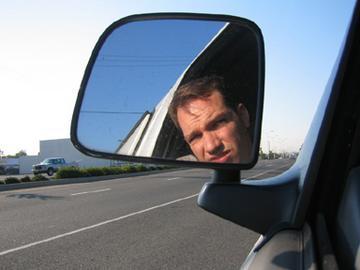Deus Ex Machina: Ray Cepeda, iTunes, and the Slow Death of the Music Industry
This originally ran in the Redding Record Searchlight in March 2006Ray Cepeda
"El Matrimonio Del Sol Y Luna"
4 Stars
iTunes
The iTunes music store recently sold its one-billionth song. This fact is as sobering as it is staggering. Music industry executives, alternating between wearing a brave face and vociferously lamenting the erosion of their beloved intellectual property and distribution rights, are slowly realizing that their business model is a thing of the past. Consumers want choice and for the past fifty-odd years, since the Rock-N-Roll explosion, the music industry has worked to monopolize choice.
Take the case of Albany, Ca. musician Ray Cepeda. After recording his recent album “El Matrimonio del Sol y Luna,” Cepeda decided to sell the album directly to music stores in the Bay Area. He was flatly rejected by every store he approached. “The message was pretty clear,” Cepeda explains, “they told me that they would never buy the album because it would never sell. They told me that the album was a loser and, by extension, I was a loser.”
Ray Cepeda is an artist who believes in both his vision and his ability. He knew that people would love his album if only they could get their hands on it or hear it. He approached several Bay Area radio stations to see if they would play the album’s single, his version of “Just the Two of Us,” the Bill Withers/Grover Washington Jr song recently sampled on a series of Viagra commercials. “The radio stations said pretty much the same thing,” Cepeda chuckles, “they told me that if the album wasn’t released on a legitimate label, they weren’t interested in playing it.” Cepeda, caught in the classic music industry catch-22, did what he does so well as a guitarist; he improvised.
Cepeda decided to get his album into the iTunes music store and, after a few months, he started receiving royalty checks. “I couldn’t believe it when I got the first check,” he states, “I received $.60 for each song that iTunes sold; that is more than I would make for selling an entire CD if I were signed to a major label.” Over the next few months, he began receiving checks from the iTunes stores in the United Kingdom and Japan. “The checks started getting bigger,” he intimates, “people started with “Just the Two of Us” before coming back to buy the rest of the album.”
A few weeks after our first interview, Ray called me to tell me that he was number five on the top one hundred best-selling Latin artists on iTunes in Japan. Remarkably, Carlos Santana, the artist to whom Cepeda is most reminiscent, was number twenty on the same list. The best part is that Cepeda has never traveled to Japan or even performed anywhere in Asia.
Although there is a paucity of data to explain how consumers buy music on iTunes, here is a very feasible explanation. “El Matrimonio del Sol y Luna” is a great album with a series of excellent songs with varying tempos featuring excellent musicianship. The original version of “Just the Two of Us,” as featured on the Viagra commercials, is currently unavailable on any of the iTunes sites as a result of a legal action concerning its distribution rights. When a consumer searches for the song on iTunes, they find Cepeda’s version and the sample that iTunes offers the consumer is very tasty. Thus, based on a thirty second free sample of the song “Just the Two of Us,” tens of thousands of people have discovered the music of Ray Cepeda.
“If you ever go to shop at the farmer’s market,” Cepeda opines, ”you can always get a sample or taste of something before you buy it. If you shop at the supermarket, you kind of have to guess what stuff tastes like or decide to buy it based on its packaging. The supermarket is like the traditional record industry, iTunes is like the farmer’s market. If the traditional music industry wants to survive, it is going to have to start thinking like the farmer’s market.”
The digital music revolution is a double-edged sword. While the insularity and disconnect that the iPod, with its telltale white earplugs and its ominous white cable, breeds is the dark cloud of the revolution, the freedom that it offers artists is its glittering, silver lining. I met Ray Cepeda at a guitar shop. I could hear him singing in the other room as I took off my iPod, and stowed it in my pocket. I made a conscious decision to engage with the guitar shop experience, the earsplitting, overdriven Metallica riffs, and the disjointed “Stairway to Heaven” noodlings. It is easy to forget, but you can learn an awful lot sometimes if you just open yourself up to the world and listen.
Ray Cepeda – www.worldrocker.com
[+/-] read/hide this post

